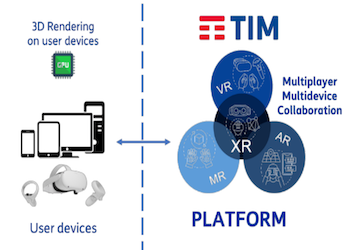UC13 - Extended XR museum experience (Turin)
The goal of this use case is to create a modular metaverse platform for visiting museums in Turin through portable devices. The use case will entail creating new interactive experiences in collaboration with museums and will exploit two different metaverse platforms. Users will be able to visit collec-tions with friends and family in remote locations and/or in presence in selected locations. A captivating narrative will also be developed to make the experience more engaging, interactive, and informative by reusing part of the results of the previous project 5G-TOURS.
Trial
In March 2025, four museums in Torino experimented with extended reality experiences applied to their collections and spaces as part of the TrialsNet project, involving over 200 people including students, visitors and museum staff.
The experimental program began on March 13 at Palazzo Madama where over 50 students from Torino high schools were able to learn about the work of Filippo Juvarra by talking to his avatar created with artificial intelligence. The “virtual” Juvarra, in addition to answering the students’ questions and curiosities, guided them through the work “Il Castello di Rivoli” by Giovanni Paolo Pannini, explaining how large architectural projects were once realized. The sketches of the Castello di Rivoli from various historical sources were then made available in a virtual room where the visitor could move around and admire them from different perspectives.
On March 17th it was the turn of the experiments at the GAM and the Museo del Risorgimento.
At the GAM 40 students embarked on a journey through the birth and development of futurism together with a “virtual” version of Filippo Tommaso Marinetti. This journey takes place both in the permanent exhibition of the GAM and in a virtual museum where visitors can recreate their own permanent collection of futurist works. “L’Aratura” by Fortunato Depero becomes the central work of the experience that aims to tell, through extended reality, how figurative art evolves in the harmony of moving shapes and colors of futurism.
At the Museo del Risorgimento, on the anniversary of the Unification of Italy, it is possible to attend the extraordinary opening of the Subalpine Parliament. Thanks to TrialsNet, this year students and visitors also had the opportunity to see the first Italian parliamentary chamber from new perspectives and angles through the use of the visor, and interact with the historical figures who frequented it. The history of the Italian Risorgimento was retraced in a quiz that allowed to retrace important moments with a more playful and engaging approach. Over 100 students and visitors were able to enjoy this experience.
On March 24th it was the turn of the Museo Pietro Micca where students from two high schools were able to preview the Pietro Micca Galleries not only physically but also virtually, taking a leap back in history of over 300 years. A gripping story accompanied by details in virtual reality allowed visitors to experience the epic moments of the siege of 1706. It was thus possible, even for people with reduced mobility, to visit one of the most important historical heritages in the history of Torino.
The experiences at Palazzo Madama and GAM were created by CrossMedia Europe with the scientific support of Fondazione Torino Musei. At the Museo del Risorgimento and the Museo Pietro Micca, museum experts collaborated with TIM to make possible a new way of accessing cultural content that is complementary to real visits, but also more inclusive and respectful of the needs of preserving the historical and artistic heritage.
In all locations, students involved in the tests were able to access both the virtual experience and a more traditional physical visit to the museums. At the end of both activities, they were invited to share their opinions in a satisfaction questionnaire that will be useful to further improve the development of the use cases.
The commitment of the City of Torino to supporting new technologies and working as a true facilitator between local institutions and innovative businesses to find and test solutions for increasingly sustainable and inclusive urban development is the basis of the motivations that have allowed the City to obtain the recognition of European Capital of Innovation 2024-25 and European Capital of Smart Tourism 2025.
